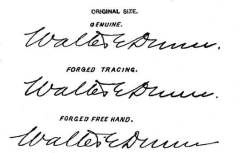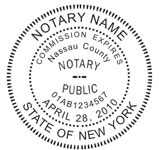Should I Start a Criminal Proceeding for Forgery in a New York Estate?
Forgery in an estate occurs when someone decides that they want to receive monetary benefit or control of another person’s assets without the permission of the person who owns the assets. Acts of forgery may be committed by strangers, family members, a caregiver or a fiduciary and may involve forging someone’s name on a check, real estate transfer deed, will, power of attorney or other legal instrument. In fact, many times the crime is committed by a close family member out of fear of loss of inheritance or greed because they want a larger share of the inheritance than their loved one has decided to give them.
As a beneficiary of a New York decedent’s estate, you have the right to file a civil litigation action with the New York Surrogate’s Court in order to recover the asset or receive reimbursement for your losses from the person who committed the forgery. You also have the option of filing a criminal complaint with the District Attorney’s office. A New York estate litigation attorney can assist you with the filing of the civil litigation matter and advise you whether a criminal matter should be instituted as well.
Example:
Let’s say your mother made a valid will while she is still of sound mind giving you control of the family business and your sister control of her real estate holdings. Your mother discusses her decisions with you and your sister. Your sister is not happy with the decision, but your mother decides not to make any further changes to her will.
Sometime later your mother’s health starts to fail and your sister takes care of her. During that time, your sister decides to write a check from your mother’s stock brokerage account to herself in the sum of $1,000,000. Your sister is not a bad person, but she feels that your mother has treated her unjustly and that she is entitled to more money because she has devoted her time as a caregiver.
After your mother passes away, as co-executor of her estate, you discover that $1,000,000 is missing from your mother’s stock brokerage account, and you trace the transaction back to your sister. She says that your mother gave her the money as a gift for taking care of her. You suspect that your sister forged your mother’s signature on the check, and you hire a handwriting expert who confirms your suspicions. Now you are left with a difficult decision as to whether you should file a complaint with the DA’s office, sue your sister in a civil litigation action or do nothing.
How to Handle the Situation?
If you are a beneficiary to a New York estate, and you suspect that there has been a forgery committed involving estate assets, you have the option of filing a complaint with the District Attorney’s Office. Whether or not to file a criminal complaint with the DA’s office against the person who committed the illegal act, especially if the forgery was committed by a close family member, is tough decision. But if there is a large enough amount of money involved and sufficient evidence to prove the forgery, a civil lawsuit should definitely be considered.
Therefore, it is suggested that you hire a New York estate litigation attorney to review and evaluate the situation to determine if a forgery has occurred as soon as you make such discovery. The longer you wait, the bigger the chance that the person who committed the illegal act could disappear with the assets, spend the money or sell the property making it harder to get the asset returned or get reimbursed for the losses to the estate and to you and the other beneficiaries.
If you do choose to also file a criminal complaint with the DA, don’t be surprised if the DA decides to wait until after the civil action has been decided, leaving your New York estate litigation attorney to do most of the discovery work during the civil litigation case. The prosecutor will then just have to look over the evidence and decide whether to use it in order to proceed with the criminal prosecution.
Under New York Statutes, a forgery can be prosecuted as a misdemeanor or felony crime. If convicted of forgery, the person can face a prison sentence, fines and penalties.
If you are involved in an estate matter concerning a possible forgery of a will, trust instrument, transfer deed concerning estate real property or other legal document, you should contact a New York probate and estate attorney to represent you in an estate litigation proceeding.
If you wish to speak to a New York estate attorney, call the Law Offices of Albert Goodwin at (212) 233-1233.


